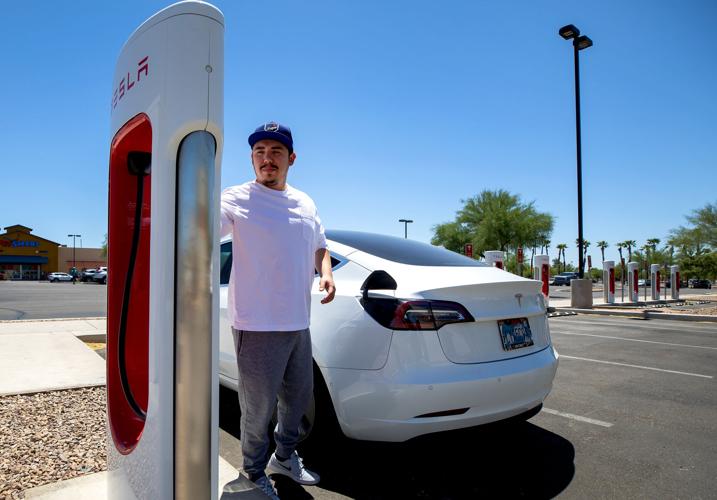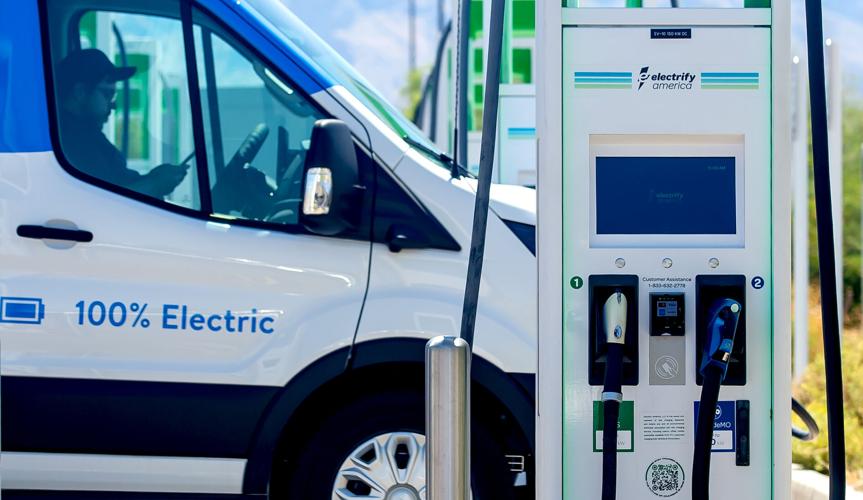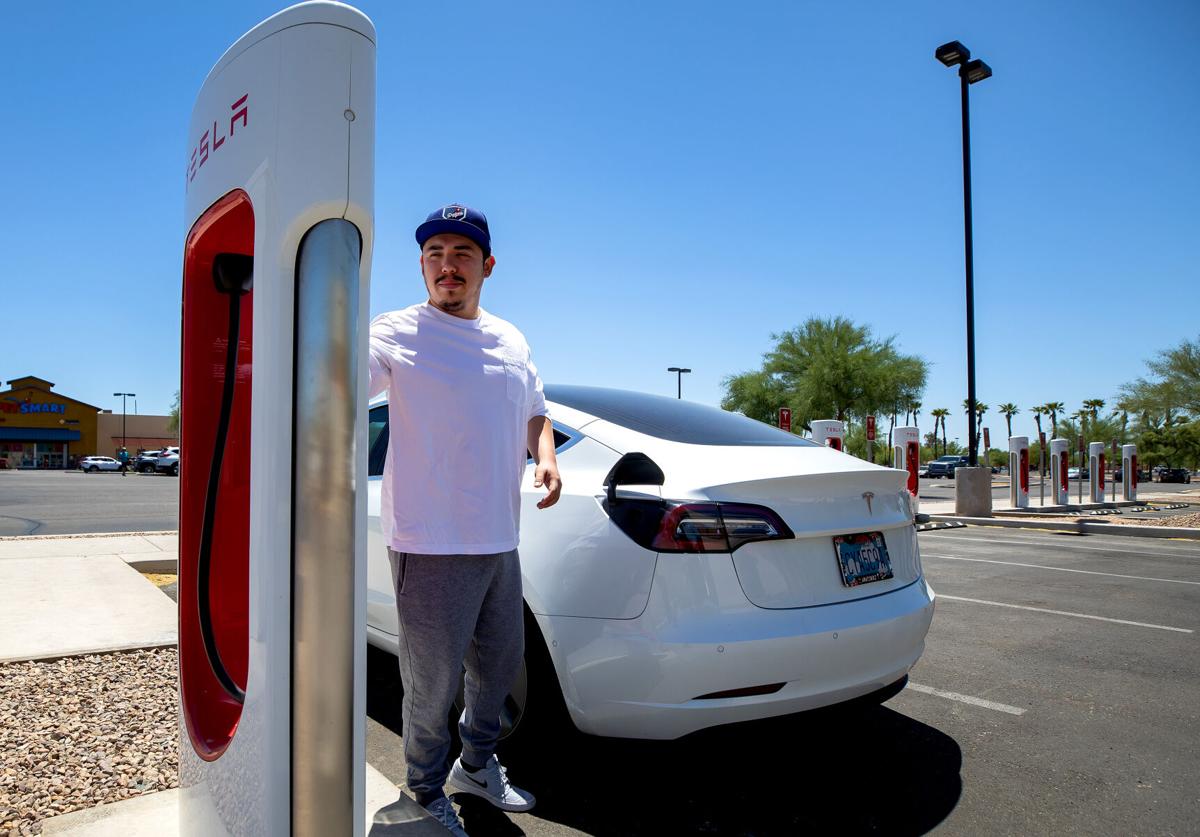The city of Tucson is looking to make it easier for electric-vehicle drivers to charge up on the go in the future, with proposed new requirements for “EV readiness” for new apartments and commercial development.
Business and landlord groups say they support EVs, but the city may be moving too far, too fast with the rules, which include requirements that larger retail businesses devote 10% of their parking spaces to a combination of charging stations and EV-ready power outlets.
The proposed building-code amendments — recommended to the City Council in April and expected to come up for a possible vote in July — would require new commercial property developments to include minimum EV infrastructure ranging from EV-capable prewiring to EV charging stations, depending on each development’s intended land use.
Developments featuring retail stores, bars, food service, entertainment and personal and technical services with 100 or more parking spaces would be required to install EV charging stations providing service within 6 feet of at least 5% of their parking spaces, while another 5% of spaces would be required to have “EV Ready” plug-in outlets.
Such developments with fewer than 100 required parking spaces would be exempt from the EV equipment requirements.
New developments for other land uses would not be required to install any EV charging stations but would be required to meet minimum requirements for EV-ready outlets and conduit.
Apartment and other multifamily housing developments and hotels would be required to install EV-ready power outlets accessible to at least 10% of their parking spaces and make 15% of their spaces “EV Capable” — pre-wired with conduit suitable for later installation of EV charging equipment.
And new commercial developments for administrative and professional, medical and research and development uses would have to be 5% EV-ready and 15% EV-capable.
Roadmap for EVs
The proposed EV requirements are part of the city’s “EV Roadmap,” a 10-year plan adopted in April 2021 to boost electric-vehicle usage as part of the city’s larger plan to address climate change.
The City Council voted last June to require every new single-family home or duplex to have one 40-amp circuit and outlet near a parking space for EV charging.
The proposed commercial parking EV requirements were developed after two stakeholder meetings last fall and were unanimously recommended to the council by the Tucson Planning Commission in March.
The City Council at its April 26 meeting voted to hold off on a decision until additional public-comment meetings could be held. The city held two additional meetings in May, and the matter is expected to go before the council again on July 12.
A city planner said the EV requirements are intended to help drive EV adoption equitably across the city, while avoiding the much higher cost of retrofitting parking lots with EV charging stations.
“Part of the reason why a regulation like this is necessary is just so there is equitable placement of those chargers throughout the city,” said Dan Bursuck, section manager for code development for the Tucson Planning and Development Services Department.
“What you’re seeing now is, there are some developments that are including it,” Bursuck said. “But you end up having those charging facilities in certain areas, but not in other areas, and if you want to see widespread (EV) adoption, you need to assure proper coverage.”
As an incentive to developers, the city’s proposal would allow developers to reduce the number of parking spaces required under its standard size-based formula by one space for each space created beyond what is mandated in the EV infrastructure ordinance.
That would save developers $5,000 or more per space based on current costs, Bursuck said.
Too far, too fast?
While local business groups including the Tucson Metro Chamber of Commerce say they support EV adoption, they contend the proposed EV requirements far outpace local demand.
In a letter to the mayor and council, the chamber cited the city’s relatively low EV adoption rate of less than 1%, and they are concerned about the EV rules driving up development costs.
“We just want to make sure what’s being required is reflective of the EV demand that we’re seeing and that’s projected in Tucson,” said Alexa Scholl, director of government affairs for the chamber.
Scholl said that city staff patterned the proposed EV requirements after Salt Lake City as a “peer city,” but that city has a much higher EV adoption rate at 2.5%, with a much higher median income and lower poverty rate.
Tucson looks a lot more like Albuquerque, which has a 2% EV ownership rate and requires new developments with 200 or more parking spaces to have EV chargers available at 2% of their spaces, she said.
Citing a correlation between higher income and EV ownership, Scholl noted that the greater concentration of EVs is outside limits in the Catalina Foothills, and there 59% of EV owners own Teslas, which have their own nationwide, proprietary charging network.
But Bursuck said the proposed rules are designed to be forward-looking and EV prices are expected to come down in cost in the next few years as automakers are scheduled to roll out more than 100 new EV models, and over time that will create a supply of lower-cost, used electric vehicles.

A Walmart driver sits in a delivery truck while the truck recharges at an Electrify America charging station at the Tucson Premium Outlets in Marana. Proposed rules for the city of Tucson would require new commercial developments to devote a percentage of parking spaces for EV charging.
Lower-income Tucson residents can benefit from overall lower cost of ownership of EVs versus gas-burning cars, he added.
The chamber also contends that the city has underestimated the cost of complying with the proposed EV building codes, especially for ongoing maintenance and the cost of vandalism.
The group said local restaurant Culinary Dropout recently faced thousands of dollars in damages to replace three vandalized EV charging stations.
In a proposal to mayor and council, the chamber proposed removing any mandates for installing EV charging stations, while scaling back the parking percentage requirements for EV-ready outlets and EV-capable wiring for some development uses.
For example, instead of being required to install any EV charging stations, developments required to install EV chargers under the proposed parking-code changes, such as bars and restaurants, would instead be required to make 5% of their parking spaces EV-capable with conduit for later charger installations. The 5% requirement for EV-ready outlets would remain the same under the chamber’s proposal.
The chamber, which has about 1,500 members, also contends that the city’s proposed parking-space offset for developers who exceed the EV equipment standards is inadequate.
The group suggested a laundry list of “compelling” incentives for developers to encourage them to install EV equipment, including construction sales-tax offset or credits and an allowance for bonus signage.
Other incentives would essentially allow developers to sidestep the proposed EV parking-code requirements by letting them pay an “in lieu fee” that would help fund public EV chargers, set up EV equipment at an offsite development, demonstrating carbon dioxide reductions consistent with the EV requirements, phasing in EV requirements for mixed-use developments and alternatively working to support EVs as part of a public-private partnership.
“We feel that this is something that should be market-driven, and incentivized with some actual incentives that are appealing,” Scholl said.
Meanwhile, the Arizona Multihousing Association, the state’s biggest trade group for apartment owners, opposes the EV equipment requirements, contending they are premature and are too costly for landlords and tenants alike amid the current housing shortage.
“It is abundantly clear that we need more inventory,” association spokesman Ben Buehler-Garcia told the City Council at its April meeting. ”Therefore it is contradictory to be considering an ordinance that will make the construction of new multifamily housing more expensive.”

David Gonzalez drives away after charging his Tesla near Sprouts at North Thornydale and West Orange Grove roads in Marana. Tucson Electric Power is offering generous rebates to commercial customers who install EV charging equipment.
“Mandating EV infrastructure on new projects will force all Tucsonans and who wish to lease in these complexes to pay the price, whether they drive an EV or not,” he added.
The city planning staff in its EV proposal noted that Tucson Electric Power is offering generous rebates to commercial customers who install EV charging equipment.
TEP is offering rebates of up to $4,000 or 75% of the project cost per EV charging port for workplaces that install at least two EV Level 2 chargers. Multifamily housing customers can get up to $5,400 per charging port or up to 85% of the cost, while commercial customers that install DC “fast chargers” can get up to $20,500 or 75% of the project cost.
TEP business customers that install EV chargers in “disadvantaged communities” are eligible for even higher rebates, including up to $6,000 for workplaces and $9,000 for multifamily housing.
The federal government offers a 30% nonrefundable tax credit for EV charger installation costs.
The chamber called such incentives and rebates “inconsistent, unreliable” and outside the control of property owners and the city, noting that TEP reduced its maximum incentive levels on June 1.
Parking changes
The proposed amendments to the city’s Uniform Development Code also include changes to allow affordable housing projects, restaurants and bars to apply for optional “Individual Parking Plans” instead of following the city’s standard parking code, which could allow them to reduce parking.
Those changes were criticized by neighborhood advocates who said the measure could negate efforts to control an ongoing problem of overflow parking in neighborhoods near hotspots like Fourth Avenue.
The city’s Bursuck said to get an Individual Parking Plan, applicants must conduct parking studies to prove there will be no impact on residential neighborhoods, and the parking plans can be amended or revoked following a public process.
Council member Steve Kozachik said those proposed parking-plan changes are a big issue and he will be asking to separate them from the proposed EV amendments for consideration by council.
“Asking a multifamily development to add some EV-ready parking slots is a different conversation than reducing parking requirements for bars and restaurants when they take up some of the parking to accommodate outdoor seating,” Kozachik said in an email.
Kozachik said bars and restaurants were explicitly excluded from the Individual Parking Plan process for a variety of factors, including patron dwell time, hours of operation and intensity of the use as it relates to parking.
Check out some innovative and sometimes overlooked energy-saving strategies that can help you and your wallet survive Tucson's summer swelter.







